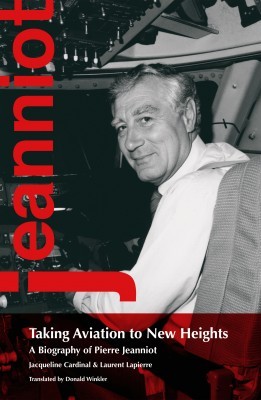In the life of Pierre Jeanniot there are plenty of lessons in how to make something of oneself: how to think clearly, work hard, succeed. Jeanniot came from circumstances that were not desperate per se, but not all that promising, either. Yet as a young technician in Montreal, he invented the “black box” flight recorder and, as president of Air Canada, he instituted computer reservation systems and no-smoking flights. The latter initiative was so successful it’s hard to imagine now that people ever smoked on planes.
As chair of the International Air Transport Association (IATA) from 1991 to 2002, he steered the restructured and rejuvenated organization through new challenges: terrorism and airline security, long lines at airports, and excessive airplane pollution. Along the way, he co-founded the Université du Québec and was its long-time chancellor – these among many other business, cultural, and charitable roles.
Born in France, in 1933, Pierre Jeanniot was the son of a family of railway station masters on his father’s side, and a well-to-do, artistic family on his mother’s. He lived
first in Addis Ababa, where his father worked for the Franco-Ethiopian Railway, then back in France, where his father abandoned the family and where young Jeanniot’s lycée decided he didn’t have the “mental capacity” for higher learning.
His older sister married a Canadian soldier and moved to Montreal; in 1947, Pierre Jeanniot and his mother followed suit – by air, no less. Fourteen-year-old Pierre was anxious and airsick the whole way. His mother became a schoolteacher and Pierre boarded with a schoolmate’s family on Marcil Avenue in NDG. He showed admirable zeal, working weekends at the Dominion store on Monkland and, earlier evaluations aside, he successfully graduated from the École supérieure Saint-Henri.

Taking Aviation to New Heights
A Biography of Pierre Jeanniot
Jacqueline Cardinal and Laurent Lapierre
Translated by Donald Winkler
University of Ottawa Press
$29.95
paper
408pp
978-0-7766-3046-5
His term as president and CEO of Air Canada, 1984 to 1990, had its share of challenges: the computer reservation system, instituted first at Air Canada and then sold to other airlines; the rise (and fall) of cut-rate airlines; turning Air Canada into a global carrier; and the privatization of the company, which Jeanniot saw as a means of raising cash to buy new planes. There was also crisis with the Association des Gens de l’Air who, in the mid-1970s, demanded more French in Air Canada cockpits. Jeanniot was seen by some as a villain at the time; a decade later, he was given an award by the same group for having promoted French in aviation.
It’s all here in this big, thoroughly researched, well-written, and very readable biography. Jacqueline Cardinal and Laurent Lapierre conducted 29 interviews with Pierre Jeanniot between 2007 and 2009, a good indication of their thoroughness. The authors, both affiliated with HEC Montréal, have distinguished academic backgrounds and are experienced researchers and writers – it shows.
Mention must also be made of the translation, by the Winnipeg-born, Montreal-based translator and filmmaker, Donald Winkler. Suffice it to say that one would never guess that this is a translation: the writing is that smooth and clear.
It is interesting to read how so many of these situations arose and how Pierre Jeanniot responded to them. And if indeed leaders are drawn to biography for the examples and lessons they provide – as the authors of Taking Aviation to New Heights say in their introduction – present and future leaders might do well to observe the examples and lessons provided in this fine biography. mRb







0 Comments